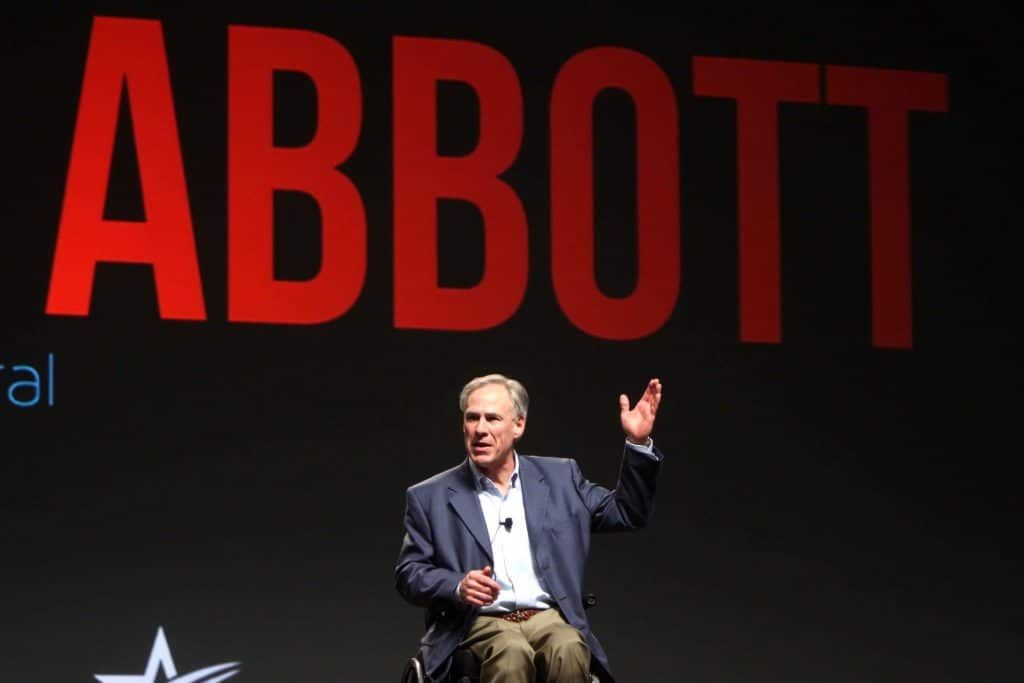Texas v Biden: the coming legal clash over vaccine mandates?
By Matt Field | October 18, 2021
 Texas Gov. Greg Abbott. Credit: Gage Skidmore. CC BY-SA 2.0.
Texas Gov. Greg Abbott. Credit: Gage Skidmore. CC BY-SA 2.0.
James Hodge, a law professor at Arizona State University, has been tracking dozens of lawsuits against COVID-19 vaccine mandates as they’ve been filed by police unions, health care workers, and others. He knows how this sort of case usually ends. “If you’re challenging a public health mandate that public health personnel or governors put into place, generally those challenges fall flat,” he said. “You basically lose.” Americans have been taking up vaccine mandates in court for more than a century and–whether targeted at smallpox 117 years ago or aimed at COVID-19 today–courts have frequently upheld vaccination requirements. That hasn’t stopped people from suing anyway.
Hodge and a colleague, Jennifer Piatt, have compiled a list that now has 57 court cases on it. The latest and greatest challenge to vaccine mandates, however, potentially comes in the form of a ban on vaccine mandates–including those put in place by private businesses–that Texas Gov. Greg Abbott issued last week.
Putting aside the morality of implementing such a ban in a state that has seen nearly 70,000 COVID-19 deaths, Abbott’s announcement raises an immediate problem for Texans: the Biden administration, taking nearly the exact opposite approach to the pandemic as Abbott, will soon release a requirement that large businesses mandate that their employees be vaccinated against COVID-19 or submit to regular testing. Employers may soon have to choose which law to break, federal or state. Given the appetite that state governments, particularly those led by Republicans like Abbott, have had for obstructing efforts to boost vaccination, it’s potentially a problem not just for Texas employers, but for others as well. The federal and state policies could soon end up clashing in court.
The Texas gambit. Abbott’s ban isn’t a lawsuit; it’s an executive order. But Hodge said there are various ways the Texas policy could clash in court with the forthcoming Biden administration vaccination and testing requirement. Republican state attorney generals have already threatened to sue over the rule. An employer in Texas forced to choose which policy to follow could sue the federal government, with Texas joining the lawsuit. Or an employer or the federal government could sue Texas.
Vaccine mandates have traditionally been upheld in courts, and if the yet-to-be released rule by the Occupational Safety and Health Administration (OSHA) withstands legal challenges, the federal policy will supersede conflicting state laws. That’s the principle of the so-called “supremacy clause” of the Constitution. Hodge, the director of his university’s Center for Public Health Law and Policy, said the courts will have to answer one overriding question, if OSHA’s policy winds up ensnared in Texas litigation: Does the federal policy conflict with the state rule?
For Hodge, the answer is clearly yes, and in that case, the federal rule “will win out.” Companies will not be able to “comply with both rules,” he said.
What Texas might argue. Even though he thinks they will all be legal losers, for illustration’s sake, Hodge laid out arguments that Texas could try to make in court. The state could argue, for example, that “we’re in control of public health,” not the federal government, he said. Or the state could allege that the OSHA rule would infringe on the rights of Texans to decide for themselves if they want a vaccine, in other words, that it would violate their personal liberty. Another potential line of attack, Hodge said, is that the state could say OSHA is overstepping its mandate from Congress to make a rule on COVID-19 vaccines. For Hodge, it’s no mystery how successful these arguments will be. “They’re specious,” Hodge said. “They’re easily shut down; courts are doing it right now.”
The federal government has the constitutional authority to regulate interstate commerce, and OSHA’s mandate to regulate workplaces is based on that principle, Hodge said. While states have a lot of responsibility for public health within their borders, the coming OSHA vaccine or testing requirement is well within the federal government’s remit. “There is no federalism violation,” he said.
As for the second possible argument—that the OSHA rule would violate individual liberty—Hodge said, “The Supreme Court, in every context related to public health that you might imagine, has stated that your liberty interests do not include your capacity as an American to engage in behaviors that could cause harm to others.”
And finally, Hodge said, OSHA will write its vaccine and testing rule so it is tied directly to exactly what Congress authorized OSHA to do. This will negate potential legal challenges alleging that OSHA under the Biden administration is overstepping its congressional mandate.
The legal durability of vaccine mandates. Vaccine mandates have withstood many legal challenges over the years, but OSHA’s rules have a more fraught history. According to a Reuters analysis, OSHA has only issued 10 so-called emergency temporary standards—which are in place for six months at a time—in its entire 50-year existence. The last OSHA emergency temporary standard, issued this summer, required health care facilities to mitigate the spread of COVID-19. The next most recent such rule came 38 years ago. Courts have blocked several of the emergency temporary standards over the years. An analysis by Hodge and Piatt found that opponents of the OSHA rule could challenge it in a number of ways.
Any challenges to the rule, if they materialize, would be in addition to dozens of others that have already been lodged against private sector and government COVID-19 vaccine mandates. Among the 57 cases Hodge and Piatt are tracking, courts have made rulings in 22. In four cases involving religious liberty issues, plaintiffs saw some success, such as winning a temporary restraining order against enforcing a mandate. In 17 cases courts have left the mandates in place. In one case, a court stopped Florida from enforcing a “vaccine passport” ban on Norwegian Cruise Line Holdings, which planned to require proof of vaccination from passengers.
Vaccine mandates, in place in all 50 states to prevent diseases such as polio in schools, have long been supported by the courts, and that streak doesn’t appear to be at risk. “In almost all cases in which courts have reached decisions, vaccination mandates have been upheld notwithstanding diverse claims,” Hodge and Piatt’s analysis said of the cases they’re tracking.
One of the most important court precedents involving vaccine mandates came in 1905, when the Supreme Court upheld states’ authority to protect their populations against epidemic disease. That ruling came after a minister named Henning Jacobson refused to comply with a Cambridge, Mass., vaccine mandate or pay a $5 fine. After losing in Massachusetts, Jacobson appealed to the US Supreme Court. John Marshall Harlan, one of the justices, wrote in the majority opinion that Jacobson insisted “his liberty is invaded when the state subjects him to fine or imprisonment for neglecting or refusing to submit to vaccination.” Personal liberty is important, of course, but as Politico editor Peter Canellos noted, Harlan understood it isn’t a boundless right. “[R]eal liberty for all,” he wrote, isn’t possible if people could exercise it “regardless of the injury that may be done to others.”
Whether Texas’s ban stands or falls, nearly half of states in the country have shown a willingness to stand in the way of policies to boost COVID-19 vaccination. Twenty-one states have implemented some form of a ban on “vaccine passports,” standardized documents that prove a person has been vaccinated, according to an analysis by the National Academy for State Health Policy. Eight states have banned vaccine mandates for state workers. And Texas isn’t even the first state to ban private employers from implementing mandates; Montana has had a ban since May.
Vaccine mandates have helped boost vaccination rates. While some, including the nuclear scientists and others at Los Alamos National Laboratory who are suing over a vaccine mandate there, argue that the COVID-19 vaccines don’t stop transmission of the disease, research is increasingly showing that is not the case, that they in fact greatly reduce the spread of the coronavirus. Meanwhile, the efficacy of the vaccines in preventing death and severe disease is indisputable. The COVID-19 pandemic has already killed more than 700,000 people in the United States, yet some governments and groups appear intent on trying to beat long odds and litigate away the best means of finally ending the worst of it. As the CEO of Norwegian Cruise Line Holdings said after Florida announced it would fight a judge’s decision to allow the company to require passengers to be vaccinated, “I mean, come on, give it up. … What does it take for common sense to rule?”
Together, we make the world safer.
The Bulletin elevates expert voices above the noise. But as an independent nonprofit organization, our operations depend on the support of readers like you. Help us continue to deliver quality journalism that holds leaders accountable. Your support of our work at any level is important. In return, we promise our coverage will be understandable, influential, vigilant, solution-oriented, and fair-minded. Together we can make a difference.
Keywords: COVID-19, Greg Abbott, Joe Biden, Texas, vaccine mandates
Topics: Biosecurity















Hmmm how does this statement have anything to do with me getting a vaccination that protects me from others not the other way around. The vaccine protects the person getting it not the people who didn’t. “ your liberty interests do not include your capacity as an American to engage in behaviors that could cause harm to others.”
My mom is from Texas. There’s a reason why she spent her childhood wanting out.